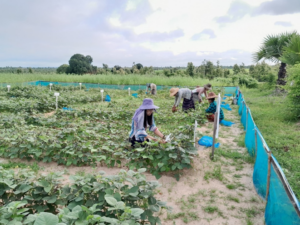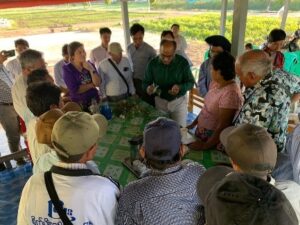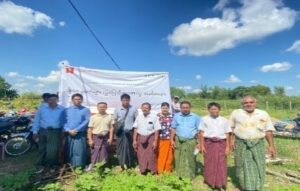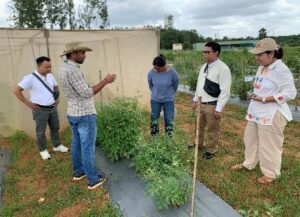Accelerating the Competitiveness and Inclusiveness of the Mung Bean Value Chain in Myanmar (ACTIOM)
The ACTIOM project in Myanmar (2019-2023) contributed to the achievement of SDG 8 by establishing a clear pathway for smallholder farmers to benefit from selling their mung beans to be processed into sprouts in the Netherlands. The project focused on two key results: increasing smallholder farm income through higher productivity and safe, high-quality mung bean production, and promoting inclusive business practices and Responsible Business Conduct (RBC) in the mung bean value chain, thereby fostering market-driven and sustainable growth in local communities.
The project consortium consisted of ICCO Cooperation, Evers Specials B.V., who sources mung beans from Myanmar, World Vegetable Centre, and the local NGO DEAR Myanmar. This initiative promoted market-driven practices and environmentally sustainable inclusive growth among stakeholders. Significantly, the project has established a public-private partnership with participation from civil society, the private sector, international research organizations, and the Myanmar government.
Due to the dual crises of the COVID-19 pandemic and political instability in Myanmar, the ACTIOM Project could not achieve all its objectives in full. Despite the challenges, the goal of reaching 7,500 farmers was exceeded and the project successfully trained 7,549 mung bean farmers (25% women; 10% youth) as Champion Farmers, who now provide on-site technical support on Good Agricultural Practices (GAP) and Good Handling Practices (GHP) to other farmers.
In the third year of the project, 102 agriculture-based collective enterprises were established, collaborating with local private sector partners for buying and selling products. The project aimed to set up 100 enterprises, with 25% women-led and at least 15% youth participation. Of the 102 enterprises established, 22 received business grants; the remaining businesses received training in business management and financial literacy.
The project distributed flyers, GAP guidelines, and Integrated Pest Management handbooks to 3,000 farmers in target villages. The ACTIOM project trained 11 private partners and six SMEs in RBC, focusing on business and human rights, gender, and environmental considerations. Before the project’s end, the World Vegetable Centre provided 10 Zero Drill Multi-Crop Mechanical Planters to lead villages in six townships. These planters are used for sowing various crops which save time for farmers in their work. Additionally, lead farmers also accessed hermitage bags for improved seed storage.
ACTIOM initiated collective selling practices in six target townships. Previously, farmers sold their produce individually and accepted prices from local collectors. The project formed Farmer Development Committees (FDCs) to practice collective buying of inputs and selling of products, which started in the 2022-2023 mung bean season. Farmers who engaged in collective selling earned 2-3% more profit compared to individual selling. This practice continues beyond the project’s end, allowing farmers to negotiate directly with large buyers and achieve better profit margins despite fluctuating prices.
All in all, the project is considered a success, as it has placed the farmers in a better place in the mung bean value chain, have improved their income opportunities through better farming practices, and also access to a niche market of better quality mung beans. This even happened under very challenging circumstances for project implementation. This could not have happened without the partnership-based and trustful approach.
Follow project progress here.
Administrative Partner ICCO Cooperation Regional Office South East Asia Key Commercial Partner Evers Specials Other Partners DEAR Myanmar, Department og Agriculture Research, World Vegetable Center Country Myanmar Sector Agriculture & agro-processing Open / Closed Closed Duration September 2019 - November 2023 Approval Year 2018








